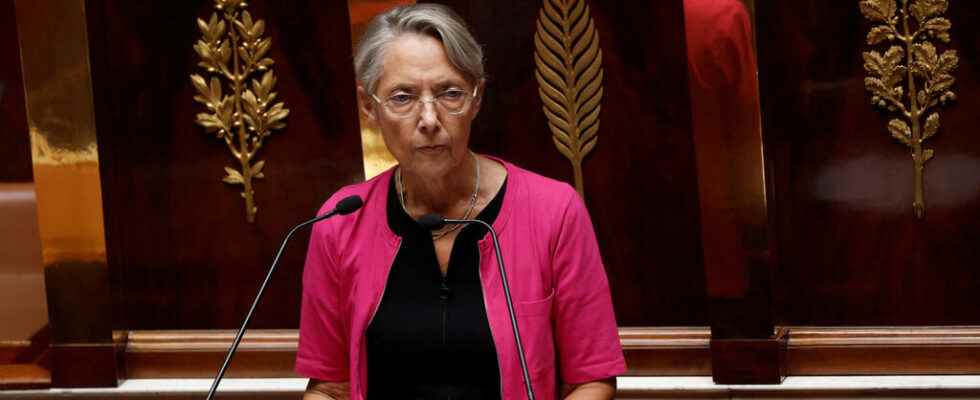Faced with a defiant Parliament where she does not have an absolute majority, Elisabeth Borne delivers her general policy statement on Wednesday. She will not engage her responsibility but must call on the opposition to ” build together ” compromises.
In search of compromise in a fragmented Parliament, Elisabeth Borne unveils her priorities on Wednesday during her general policy statement, without incurring her responsibility before the National Assembly where the left-wing Nupes coalition tabled a motion of censure.
Unlike many of her predecessors, the Prime Minister will not submit to a vote of confidence after having exposed her method of government, from 3 p.m. before the deputies then at 9 p.m. before the senators. The leaders of the various groups will intervene in his wake in an atmosphere that promises to be electric. Surrounded by several ministers, she said to herself ” serene and focused by walking to the National Assembly from the Hôtel de Matignon.
A call for “compromise”
The new Prime Minister began by calling for finding “ compromises » and to « build together solutions to energy price or climate challenges, adding that “ disorder and instability are not options “.
Launching her general policy statement before the National Assembly, the Prime Minister assured that she wanted to lead ” for each subject a dense consultation “. ” We will approach each text in a spirit of dialogue, compromise and openness “, she insisted, calling for the construction of “ project majorities “.
The reform of pensions and Pôle Emploi in the line of sight
She then warned that the French should “ work gradually a little longer “.
” Our country needs a reform of its pension system », reform which « will not be uniform ”, which “dwill have to take into account the long careers and the hardship ” and “ ensure the retention of seniors in employment “, added the Prime Minister, specifying that this reform would be carried out “ in consultation with the social partners, involving parliamentarians as early as possible “.
Reform ” is not tied. It won’t be take it or leave it. But it is essential “, assured Elisabeth Borne, in particular “ to build new social progressx », « for the prosperity of our country and the sustainability of our pay-as-you-go system “.
The President of the Republic Emmanuel Macron, who wants to postpone the retirement age to 64, or even 65, at the rate of four additional months per year from 2023, had affirmed in May his wish to see this reform implementation in the summer of 2023, a timetable compatible with the start of discussions at the start of the school year in September.
Élisabeth Borne also felt that full employment was ” within reach “and went through a simplification of the accompaniment” too complex of the unemployed through a “ transformation of Pôle emploi in France Work “. The Prime Minister has not set a specific date or figure for this goal. Full employment in France is generally considered an unemployment rate around 5%.
“ During the previous five-year period, we have already come halfway towards full employment “, she pointed out. At 7.3%, the unemployment rate is “ lowest in 15 years ”, consequence according to her of the reforms of apprenticeship, unemployment insurance, investment in the training of job seekers and the plan “ a young person, a solution “. To achieve full employment, we must bring back to employment those who are furthest from the labor market “, she estimated.
Renationalise EDF
France wants to renationalize 100% of the electricity company EDF, then announced the Prime Minister. “ I can confirm to you today the State’s intention to hold 100% of EDF’s capital. This development will enable EDF to strengthen its ability to carry out ambitious and essential projects as soon as possible for our energy future. “, she declared before the National Assembly.
The French State now owns nearly 84% of the electrician, 1% being held by employees and 15% by institutional and individual shareholders. The group, already heavily indebted, is facing heavy financial burdens, and is also being challenged by the French government to launch a new nuclear reactor program. ” The energy transition goes through nuclear “, affirmed Élisabeth Borne, taking up the position adopted this winter by President Emmanuel Macron.
Of the ” radical responses to the ecological emergency »
The Prime Minister promised radical responses to the ecological emergency “, whether it be ” in our way of producing, housing, moving, consuming “. ” From September, we will launch a vast consultation with a view to an energy-climate orientation law “, she announced during her general policy statement to the National Assembly.
“ We are going to define an action plan together. A battle plan ” for a “ ecological revolution “, she hammered, adding that each minister would have a” climate and biodiversity roadmap and that she herself would lead the ecological planning. Of the ” emission reduction targets, milestones and appropriate means “will be defined” sector by sector, territory by territory », with local elected officials who « very often, in their territories, have shown the way “, she insisted.
France will be the first major green nation to phase out fossil fuels ” in order to guarantee its “ energy sovereignty in the face of hydrocarbon-producing countries like Russia, she promised.
(with agencies)
